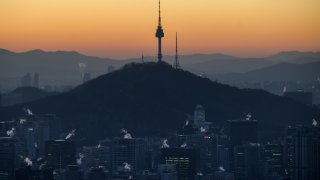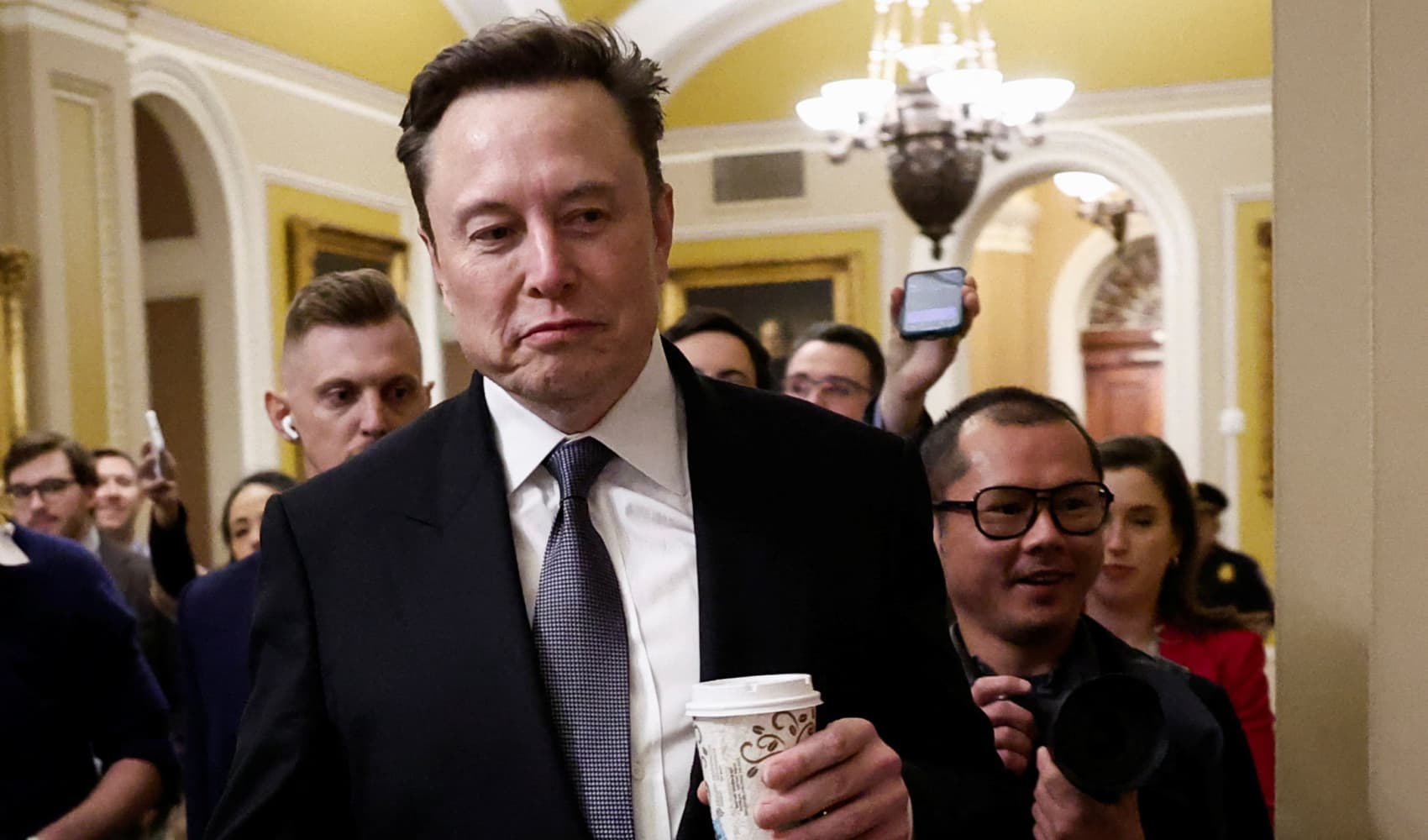
This is CNBC's live blog covering Asia-Pacific markets.
Asia-Pacific markets were largely lower as investors braced for further hikes ahead as Federal Reserve speakers reiterated more hikes are needed to tame inflation.
Minneapolis Fed President Neel Kashkari on Wednesday said the Fed will "continue doing what we're doing until we finish the jobs, and I'm committed to doing that." The U.S. 10-year Treasury yield briefly topped 4% overnight.
In Japan, the Nikkei 225 fell marginally to end at 27,498.87 and the Topix closed 0.16% lower at 1.994.57 . South Korea's Kospi climbed 0.62% to finish at 2,427.85, while the Kosdaq lost 0.56% to close 787.19.
Asia's Tesla suppliers were also closely watched as the company's stock fell more than 5% in after hour trade as Investor Day fell short on details about any new products or services.
Australia's S&P/ASX 200 rose marginally to end the day at 7,255.4. Hong Kong's Hang Seng index was 0.8% lower in its final hour of trade, while the Hang Seng Tech index fell 1.09%.
In mainland China, the Shenzhen Component lost 0.54% to finish at 11,849.5, while the Shanghai Composite was fractionally higher to end at 3,310.65.
Money Report
Overnight, U.S. stocks were largely down as both the S&P 500 and Nasdaq Composite saw losses, while the Dow Jones Industrial Average ended the day just above the flatline.
— CNBC's Tanaya Macheel and Alex Harring contributed to this report.
Look to China's modernization journey for opportunities as China recovers: CICC
China's economy is likely to grow at a faster pace of 5.5% this year, compared with 2022's figure of 3%, and as such, executive director and macro analyst at China International Capital Jundong Zhang thinks this will bode well for Asian markets.
Speaking to CNBC's "Street Signs Asia," Zhang forecasts that consumption may recover faster than expected as Covid-19 infections recede.
He estimates retail sales of consumer goods will grow 7.7% in 2023, mainly from the conversion of excess savings. Fixed asset investments are expected to grow 8%.
Zhang also thinks that the "Two Sessions" meeting beginning this Saturday in China will provide more clarity regarding "next generation growth engines," like artificial intelligence.
"We suggest paying attention to fields related to the Chinese path to modernization, such as technological innovation, security, [and] green and inclusive development."
—Lim Hui Jie
U.S. dollar is set to fall later this year as Southeast Asian currencies strengthen: HSBC
The U.S. dollar will likely depreciate later in 2023 after seeing some short-term support from rising interest rates, according to James Cheo, Southeast Asia chief investment officer at HSBC's global private banking unit.
Speaking to CNBC's "Street Signs Asia," he said the greenback will likely "lose very much of its steam" as markets are "very near the peak of interest rates."
Cheo said he believes thinks that most Southeast Asian central banks should also be at the end of their tightening cycle, which means that their currencies will see some stabilization or "a little bit of strength."
— Lim Hui Jie
China may aim for 6% growth target in 2023: Reuters
China may announce a growth target of 6% for its 2023 gross domestic product on Sunday, Reuters reported, citing people involved in policy discussions.
The target would mark a notable shift in optimism within the government in comparison to November, when policymakers expected growth of between 4.5% and 5.5%, the report said.
The government is also likely to announce more stimulus during the session, Reuters reported.
– Jihye Lee
Singapore's PropertyGuru jumped 1.68% as it narrowed net losses by almost 30%
Singapore-based classifieds firm PropertyGuru jumped 1.68% as it posted a narrower net loss and improved revenue in its latest earnings report on Wednesday.
Net losses for the fourth quarter of 2022 came in at $5.2 million Singapore dollars ($3.86 million), down nearly 30% from SG$7.8 million a year ago. Revenue jumped 17% to SG$40 million in the quarter.
Maximilian Koeswoyo, research analyst at Phillip Securities, said the 30% improvement in net loss is "commendable."
"I believe the stock is going to face some challenges in the near-term, especially with the cooling measures by governments across the Southeast Asian region, but I think it's going to have a major turnaround once PropertyGuru shows an early signs of trajectory towards positive net profit after tax," said Koeswoyo.
Its stock has lost 42.9% of its value since its March 2022 listing.
— Sheila Chiang
South Korean stocks buck trend after returning from holiday
Seoul-listed stocks traded broadly higher in Thursday afternoon's session, bucking the trend in the wider Asia-Pacific region.
Investors further digested economic data from Wednesday, which showed the country posting a narrowed trade deficit, when markets were closed to observe Independence Movement Day – as well as China's surprise jump in its purchasing managers' index data.
The steel and metals industry saw gains of more than 4.4% while chemicals rose by 3.6%.
Hyundai Steel rose 6.43%, Posco Holdings gained nearly 6% and Lotte Chemical climbed 3.37%. Auto names such as Kia rose nearly 4% and EV battery-maker LG Energy Solution rose 2.5% after Tesla's Investor Day.
South Korea's trade official Jeong Dae-jin also held high-level talks with China's Lie Fei, according to a readout by the ministry. The two discussed stabilizing supply chains and called for further cooperation.
– Jihye Lee
Amazon Web Services plans to invest $6 billion in Malaysia by 2037
Amazon Web Services announced plans to set up an "infrastructure region" in Malaysia and invest $6 billion in the country by 2037.
An AWS "infrastructure region" is a physical location where the company clusters data centers.
AWS said the new region and investment reflects the company's commitment to Malaysia and to "serving sizeable and fast-growing demand for cloud services across Southeast Asia."
Malaysia's Prime Minister Anwar Ibrahim called the AWS investment "the largest international technology investment to date" in the country and said it supports Malaysia's "cloud-first ambitions."
—Lim Hui Jie
Nio's Hong Kong-listed shares plunge 12% after earnings miss
Shares of Chinese electric vehicle manufacturer Nio in Hong Kong have plunged over 12% after it reported a widening net loss of a 5.79 billion Chinese yuan ($838.9 million) for the fourth quarter.
This follows an almost 6% drop in its U.S.-listed shares on Wednesday night after the earnings were released.
Nio's share price in Hong Kong has has fallen more than 12% year to date, and over 55% compared to a year ago.
—Lim Hui Jie
South Korea's factory activity remains in contraction territory for eighth straight month
South Korea's manufacturing purchasing managers index remained in contraction territory for the eight straight month, coming in at 48.5 for January.
While this was unchanged from December's figure, S&P Global said in its note that this was "indicative of a further deterioration in the health of the South Korean manufacturing sector".
It also added the latest PMI data "pointed to further contractions in both output and new orders amid dampened global economic conditions and sustained price pressures".
A PMI reading of 50 indicates expansion, while a reading below 50 signals contraction.
— Lim Hui Jie
Japanese banks indicated interest in government bond purchases: Nikkei
Japanese financial institutions have indicated interest in buying Japanese government bonds looking ahead to the Bank of Japan potentially turning to policy normalization, Nikkei reported.
Sumitomo Mitsui told Nikkei that its basic thresholds are 1% in the 10-year yield and 2% in 20-year yield, expecting bullish sentiment to follow the central bank further widening its yield tolerance range.
Mizuho also told Nikkei that domestic investors would purchase Japanese government bonds if the central bank was to abolish the yield curve control scheme altogether, adding that it does not see market turmoil to follow the move.
– Jihye Lee
Japan corporate survey shows softer outlook ahead
Japan's cabinet office annual corporate survey showed sector-based gross domestic production forecasts for the year ahead averaged at 1.3%, a decline from the previous reading of 1.5%.
The softer outlook was driven by lower expectations from manufacturers in comparison to non-manufacturers, the survey showed.
The five-year outlook from the survey meanwhile improved to 1.2% from 1.0%, marking the highest reading since 2014.
– Jihye Lee
Shares of Tesla suppliers mixed after automaker's stock plunges over 5% after hours
Shares of some Tesla's suppliers are trading mixed after the carmaker's shares plunged more than 5% in after hours trade.
LG Chem, which supplies battery cells to Tesla, saw its shares fall by 0.59%. But other suppliers, like Panasonic saw its shares rise by 0.43%, and Samsung SDI saw a larger climb to 1.95%.
At its investor day presentation on Wednesday, the company said its goal was to produce 20 million electric vehicles per year by 2030.
Most notably, Tesla had pledged to halve production costs for its vehicles, with chief engineer Lars Moravy saying that the company expects to build its next-generation vehicles for half the cost of the current Model 3 or Model Y.
— Lim Hui Jie
Chinese EV maker Nio slides on earnings miss
U.S.-listed shares of Nio slid about 4% after the Chinese electric vehicle maker reported a wider-than-expected operating loss of 6,736.1 million Chinese Yuan ($976.7 million U.S.) for the fourth quarter. That's a much wider loss from the year prior.
"While vehicle revenue of Rmb14.8bn (+24% QoQ) came in largely in-line, vehicle gross margin of 6.8% (down 9.5ppt QoQ) surprised on the downside. The company attributed the drastic margin contraction to: 1) inventory provisions; 2) accelerated depreciation on production facilities; and 3) losses on purchase commitments to suppliers for NT1.0 models," said Morgan Stanley analyst Tim Hsiao, who has an overweight rating on the stock.
The automaker also provided weak guidance, Citi analyst Jeff Chung pointed out. He has a buy rating on the stock, but emphasizes it is a high-risk investment "given the company's start-up positioning, early stage of product deliveries, other operational risks, the risk of original financial investors selling stakes in the future,as well as the shares' relatively brief trading history."
UBS, on the other hand, is neutral on the stock, calling it "our least preferred EV name under our coverage."
— Michelle Fox
South Korea's industrial output records fourth straight month of decline
South Korea recorded a 12.7% contraction in its industrial output for January on an annualized basis, marking its fourth straight month of decline.
This was a steeper fall compared to December's revised figure of a 10.5% contraction, and also lower than economists expectations of 8.9%, according to Refinitiv data.
The Korean won strengthened marginally against the U.S. dollar on Thursday, trading at 1304.42.
—Lim Hui Jie
Fed's Kashkari open to higher rate hike at March meeting
Minneapolis Federal Reserve President Neel Kashkari said Wednesday that he's open to the possibility of a larger interest rate increase at this month's policy meeting, but hasn't made up his mind yet.
"I'm open-minded at this point about whether it's 25 or 50 basis points," the central bank official said during an event in his home district.
A voting member on the rate-setting Federal Open Market Committee, Kashkari said the "dot plot" of individual members' future expectations will be more significant than what's decided at the March 21-22 meeting.
He noted that his "dot" was higher than most of the other FOMC members at the last meeting, when the committee stepped back the level of previous hikes to a quarter-point move. Kashkari indicated the he again is likely to tilt to the hawkish side in view of recent data that shows inflation remains high despite all the rate increases over the past year.
"At this point I have not decided what my dot is going to look like, but I lean towards continuing to raise further. I would continue to push up my policy path," he said.
—Jeff Cox
Manufacturing still in contraction, prices jump in February ISM reading
Manufacturing remained in contraction during February as production and new orders slowed, the Institute for Supply Management reported Wednesday.
The closely watched ISM Manufacturing Index registered a 47.7% reading, representing the percentage of companies reporting expansion. A reading below 50% represents contraction.
Economists had been looking for a headline reading of 47.8%, according to Dow Jones.
In the details, new orders rose but remained in a pullback at 47%, while the production index edged down to 47.3%. Importantly, inflation re-emerged in the sector, with the prices index jumping 6.8 percentage points to 51.3%. Employment nudged down into contraction territory with a 49.1% reading.
—Jeff Cox
Stocks chop lower as 10-year yield pushes above 4%
The 10-year Treasury yield took another run at 4%, as stocks chopped lower in afternoon trading.
The 10-year was at 4.004% in mid-afternoon. The 10-year yield breached 4% for the first time since Nov. 10 in late morning trading, but backed off below that level temporarily. Yields move opposite price.
Traders have been watching the negative correlation between stocks and the benchmark 10-year's move to the key 4% psychological level. Chart strategists say the level is not important resistance, but it is important in terms of the impact on investor sentiment.
Tech and growth stocks are particularly sensitive to moves in the 10-year yield. The Technology Select Sector SPDR Fund, which repesents the tech names in the S&P 500, was off 0.8%.
Bond strategists expect the 10-year yield to continue to rise, ahead of the Fed's March 22 rate decision. Any strong inflation or even jobs data could be a catalyst for a move higher.
Michael Schumacher of Wells Fargo said the 10-year could easily reach 4.20% in the near term.
—Patti Domm
CNBC Pro: Is the traditional 60/40 portfolio dead? Morgan Stanley's Jim Caron has a theory about that
The 60/40 model, in which investors put 60% of their money in stocks and 40% in bonds, was once the linchpin of a typical investment portfolio. Morgan Stanley's Jim Caron tells CNBC if he's still convinced now that rates are higher for longer.
Pro subscribers can read more here.
— Zavier Ong
CNBC Pro: Looking for higher yields? These short-term bond ETFs come out on top
The surge in Treasury yields is taking markets by storm, and investors are now looking to bonds for yield — particularly short-term ones.
Want to cash in on funds with the highest yields? CNBC Pro screened for top-rated, ultra-short term bond funds and ETFs using Morningstar data.
CNBC Pro subscribers can read more here.
— Weizhen Tan






